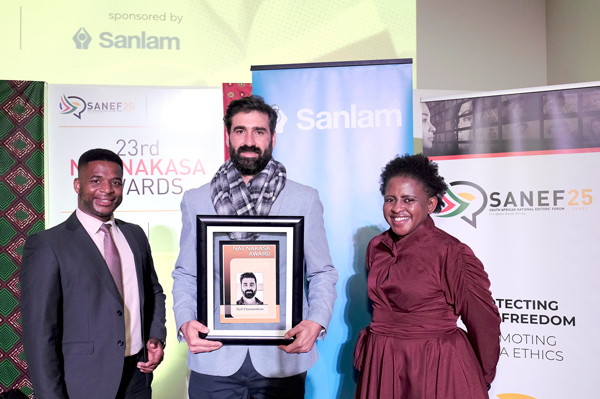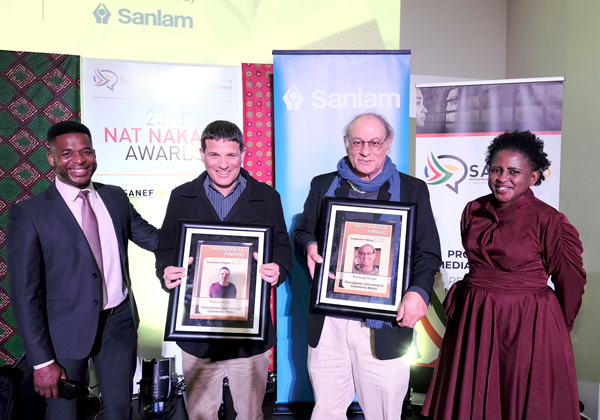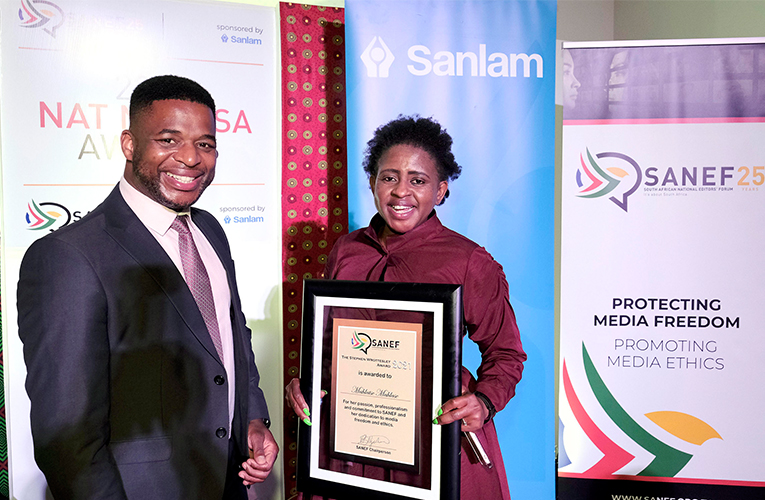The night courageous journalism triumphed in Sophiatown and how the game has changed
By Edward Tsumele, CITYLIFE/ARTS Editor

Let me indulge a bit about the profession that I am in, which is journalism, If you will allow me to do that for a moment. A lot of us who are in this profession will tell you quite a lot of things about this profession or craft called journalism, and one thing that will form a part of the thread of the narrative about this craft is that we are not in it for the money, but that it is some sort of calling beyond one’s personal ambition of material acquisition. In any case, there is not much to accumulate there with regards to material, as compared to other professions. Some will also readily advise that it is much better to pursue other professions other than journalism, If your primary motivation is money. They will recommend other professions, such as engineering, accounting, economics, law real estate or science . And by the way, the journalism profession has many people with various qualifications, including those I have just mentioned above, but those people have chosen to pursue journalism instead of the above.
Mad a decision as it may seem, however there are compelling reasons for this, the main one being to provide a public service, which in a democracy, is quite essentially. These men and women in this profession sacrifice so much, including turning down more lucrative offers from the private sector and the public service, in pursuit of doing something paying less, but providing a service that changes people’s lives, sometimes, and that creates a better world where social justice and fairness must prevail. And more importantly, journalism is a noble profession in that it is a watch dog over those who wield power, such as politicians and their ruling parties and those who wield the wheels of power through their wealth. Journalism has come to be known as become to be regarded as an increasingly important part to how people are governed and by who, hence it is sometimes referred to as the Third Estate.
However when it comes to monetary reward, the only thing I must say is show me a journalist who is a millionaire today. I bet you will not find many of them.
The truth is the animal called journalist, is definitely not those who are pursuing material wealth are found. In many respects it is a thankless calling, rarely attracting praise for a job well done, but in most cases, attracting criticism by especially those who are caught on the wrong side of the law or moral campus.

And yes, since democracy dawned in South Africa, we have witnessed quite a number of media professionals going into the private sector and public service to occupy senior positions where salaries are huge compared to what journalism could offer. But one thing though remains, and that is that at heart, these professionals remain journalists, and quite honestly speaking, a number them are quite bored in those positions, and wish they were getting the same salaries in the profession they enjoy.
But that of course will not happen as media houses continue to face huge challenges, such as massive retrenchments that some have come to call newsroom bloodbath, as media houses battle to remain afloat as a result of competition for the advertising cake from the digital world.
Today’s newsrooms have become so junior to an extent that legacy media’s newsrooms have become so unrecognizable that there is no name that the public can today connect with a major story that changed events in South Africa, or with an exceptionally good writing style, as battled scared and experienced newshounds have either been retrenched, joined the private sector, or started afresh as entrepreneurs. Of course there are a few exceptions, a crop of experienced media professionals still battling the war in these legacy media houses. But they are simply too few as the houses continue to lose this much needed talent and experience in newsrooms.
Personally I should know better as I have been in this profession called journalism for over two decades now, and am still there and have in fact decided, this should be my calling. However I must confess that I have dabbled bit in the private sector and still get approached by all sorts of would-be employers, including government, and I must say, the check sometimes being dangled is quite tempting as compared to the bag in this profession called journalism.
Not all is lost in journalism though, as there is light at the end of the tunnel, and that light is the opportunity offered by digital technology for new media ventures that are innovative and find a new model to deliver content that connects with a wider audience globally.
In South Africa, online publications are increasingly finding a model that works. The case in point is BusinessTech, an online business publication that has now emerged as the most widely read online publication in South Africa, entirely relying on advertising for its sustainence, its biggest growth having been achieved since lockdown from 2020 when it gained massive readership, that propelled it to the top tier of business publications in the country.
And yet there is another phenomenally successful online publication in South Africa, that in fact has become the most effective player in the media space, especially when it comes to public service journalism, exposing grand corruption in government and the private sector, and that is Daily Maverick.

It is the courageous journalists from this online publication with humble beginnings that exposed for the first time, what is today called State Capture in South Africa. It is also the same online publication that has exposed recent corruption in the Department of Health regarding Covid-19 related funds. That expose cost a national minister of Health and a provincial MEC of Health their jobs. And its business model is simple but effective it relies on donations by both the public and the private sector.
The publication is now starting to reap the rewards from its efforts. When Daily Maverick (which this year also launched a hard copy weekend publication called Daily Maverick 168) Chief Executive Officer Styli Charalambous on Saturday, 14, 2021, walked away with the Nat Nakasa Journalism Award for Courageous Journalism for 2021, organized by the South African National Editor’s Forum (SANEF), at a gala dinner held in Sophiatown, west of Johannesburg, most of us within the profession and outside journalism, unanimously agreed that Daily Maverick in General and specifically its CEO, deserved this award with no doubt.
It was quite interesting also that the other major award of the night was also won by an online publication , based in the Western Cape, called Ground Up, and not a legacy media organisation. This is the first time in its 23rd history that this award ceremony’s two major categories have been won by a non legacy media institution and journalists working for such institutions. The awards are sponsored by Sanlam.
And here is what unfolded on the night of the awards ceremony.
The winners of the 23rd Nat Nakasa Journalism Awards, sponsored by SANLAM, were announced at a gala dinner at The Trevor Huddleston Memorial Centre in Sophiatown on August 14. The flagship event of the South African National Editors’ Forum (SANEF) awards journalists who have shown courage and tenacity in the face of enormous challenges and displayed a commitment to serving the people of SA with integrity, resisted censorship, and striven for truth and accuracy in their reporting.
The winner of the Nat Nakasa Awardfor 2021is Styli Charalambous, the CEO and co-founder of Daily Maverick. Since its inception the publication has become one of the leading online and a printed publication in SA, in part because of the commitment and passion of the former chartered accountant. Styli says he is now “fully reformed and passionate about the media business”.

This year, the Nat Nakasa Award Community Media was made to Nathan Geffen and Raymond Joseph for their work in the community news agency GroundUp. Since 2018, this small online community news agency has persisted with a series of investigations into the National Lotteries Commission (NLC) that have uncovered corruption, maladministration, and nepotism. The news agency’s work in general — and its reporting on the lotteries scandal in particular— provides a sterling example of good community journalism in action. Editor Geffen started GroundUp 10 years ago, as a donor-funded community news agency focusing on social justice issues.
The coveted Stephen Wrottesley Award went to Mahlatse Mahlase, chairperson of SANEF 2016 – 2020 and current secretary-general. The award was presented “for her passion, professionalism and commitment to SANEF and her dedication to media freedom and ethics.” Mahlase embodies what SANEF stands for: an unwavering passion for media freedom and a deep commitment to make South Africa a better and more equal place for its citizens, through journalism. Nominated by her peers, Mahlase steered SANEF to financial and organisational stability and has led SANEF in its principled campaign against prevailing hate speech and online abuse against journalists. She championed SANEF’s activism to push back against the abuse of particularly women journalists by politicians and online trolls.
In addition, SANEF recognized five community radio stations this year which have shown determination and bravery in serving their communities: Alex FM; Westside FM 98.9 MHz; Mams Radio; Intokozo FM and Kasie FM 97.1. The prizes were awarded from the SANEF Media Relief Fund.
The panel of judges for the awards represents different generations, value and respect each other’s opinions and have robust discussions around nominees:
Peter Sullivan, convenor of the panel since 2006, offered the following: “There are many instances of courage in journalism, both under apartheid and the current democracy. Journalists yearn to laud their own, to show we do a tough job, sometimes under severe threat, often unappreciated and even scorned. This award shows our audience and the country and our fellows that their courage does not go unseen.”
Commenting on the value of the awards, Crystal Orderson, who has been on the panel since 2018 and is known for The Africa Report on 702 Talk Radio, said: “It is important that we recognise differences in our media environment but also pay homage to Nat Nakasa and reflect on the role of the media in SA and making a difference in the media landscape, ensuring access to ordinary South Africans. Covid-19 has made immense challenges to the media, so we looked for those stand-out publications that really had major obstacles to overcome.”
Veteran journalist Joe Thloloe, a previous award winner, colleague of Nakasa’s and panelist since the inception of the award in 1998, recalled the moment he won: “When the MC at the SANEF dinner in Durban called my name, it was particularly moving for me, because nobody had even whispered the information to me ahead of the time; the weight of Nat’s one-way ticket out of South Africa to take up a Nieman Fellowship at Harvard University in 1964 and his tragic death in exile hit me afresh; and, the award was modeled on the Louis Lyons Award at the Nieman Foundation…I shed tears when the announcement was made. At the time, the apartheid government had banned me, I couldn’t work for any publication and had been in jail a few times for my beliefs and was to continue that journey for another 12 years.”
Thloloe went on to elaborate: “We don’t look for just a competent journalist; we don’t look for technical excellence – we look for a media worker, a journalist, a publisher or media owner who has been courageous and fought against all that stood in his path to publish, keeping the flag of Section 16 of the country’s Constitution flying high.”
I can bet, the joy that seized those who were recognised on the night, not even money can buy, and that is perhaps the nobility of this profession called journalism as it is priceless, especially if it is practised with fairness, courage and integrity.










